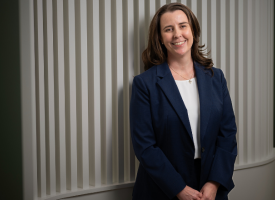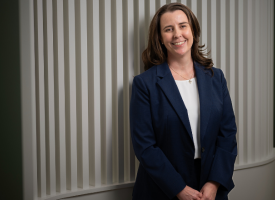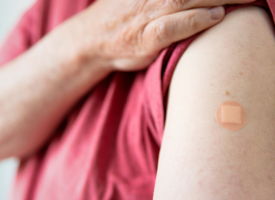Transcript - AMA President Dr Omar Khorshid says AstraZeneca vaccine critical to combat growing Covid-19 Delta outbreak
Dr Omar Khorshid: The AMA has heard with alarm the new figures from NSW today showing that instead of the current lockdown settings causing COVID number to decrease to zero, we’re in fact seeing them increase. Meaning that, six days in we are really worried that this lock down is not going to work.
I think we’ve seen that acknowledged today by the Premier and the Chief Health Officer of NSW who’ve now started talking about a new strategy for managing this Delta outbreak in Sydney. And it’s quite possible that Australia’s lockdown strategy that has worked so well with all the previous outbreaks we’ve had is simply not strong enough, not fast enough to deal with Delta. And its possible a new approach, particularly for Sydney, but possibly for the rest of the country will be required.
Now, any new strategy for Sydney is going to include vaccinations. That’s very clear and it’s been said today by the NSW government. We’ve also heard that NSW wants Pfizer vaccines from the rest of the country. And whilst we’re sure that’s being discussed very robustly at National Cabinet as we speak, it is not likely that large amounts of Pfizer are going to find their way into NSW anytime soon.
So, what that means is that we need to take a new approach. The AMA today has been in contact with one of the co-chairs of ATAGI to advise ATAGI that, in our view, it is time to reconsider the advice around the AstraZeneca vaccine for young Australians, given the reality in Sydney.
When ATAGI made its original advice on the under 50s and then the under 60s, it was in the settings of a choice between waiting for Pfizer for younger Australians in a setting of very little risk of COVID or having AZ now. Whereas for Sydneysiders, it could be a choice between having AZ now and having no vaccine, and therefore having COVID. And we know that COVID is so much more dangerous than any vaccine.
So, what we are suggesting to ATAGI is that the settings in Sydney are different. The reality is different, and it may time for clear advice to all young Australians in Sydney that AZ is a very safe and effective vaccine and is the best way to help Sydney get out of this current crisis.
We have supplies of AZ that we simply do not have of the Pfizer vaccine. And using AZ is really the only way we can see of rapidly changing the scenario in Sydney in terms of how many people are vaccinated, to give Sydney any hope of exiting these lockdowns anytime soon.
Question: Would you say the outbreak in Sydney is now a national emergency?
Dr Omar Khorshid: We think the Delta situation in Australia is already a national emergency. We’ve seen how the virus has spread out of Sydney already to other states and to rural NSW. And of course those other states are struggling to also constrain their Delta outbreaks, with a very rapid lockdown in Victoria not yet having had the desired effect of seeing those cases come right down. Delta is different. And it may be that we need a different approach to our vaccination program in order to recognise that.
Question: Just to clarify, is it the AMA position that other states shouldn’t give up their Pfizer stocks for NSW?
Dr Omar Khorshid: There’s a good argument to send more Pfizer to NSW to help deal with this crisis in Sydney. But we also recognize that each state and territory leader has a responsibility to protect their own people. Here in Western Australia, we have the lowest rate of vaccination in the country. So, to take Pfzier away from here is only going to make that situation worse.
We also don’t have huge amounts of Pfizer sloshing around in the other states waiting to be sent to NSW. It simply doesn’t exist and the only way to really ramp up vaccination in Sydney is to use AZ.
Question: You want ATAGI to reconsider its advice for people in Sydney. Do you think that advice should be broadened to people in WA, and that people in WA should reconsider taking the AZ vaccine?
Dr Omar Khorshid: ATAGI are the experts on vaccination. And what we’re saying is that let’s recognize that Delta is different. The country is now in a different situation. The Premier of NSW has called it a national emergency and maybe that means the advice should be different for all Australians but right now, in particular, right now, the crisis is in Sydney and that’s where we’re suggesting a change in approach.
Question: Can we talk about the jab announcement for the kids aged 12 to 15. Any idea when this will start?
Dr Omar Khorshid: So what’s happened in terms of vaccination for children is that the Therapeutic Goods Administration (TGA) has registered that vaccine for people for use for people between the ages of 12 and 15. That doesn’t mean it’s available as yet for any children and we’re still waiting on advice from ATAGI, the expert committee, and of course decisions from government on how and when they’ll roll that out. We’ve heard that from both ATAGI and government that their expecting the initial roll out for children may just be for high-risk children who are living with chronic diseases or who have poor immunity already to viruses and other infections. And that makes sense because clearly those children right now, particularly in places where there are outbreaks going on, they are at risk of COVID. It is different for young healthy Australians particularly between the ages of 12 and 15 and a decision from ATAGI that they will be included in the program is not a given. We have to wait for the experts to weigh up the risks and benefits of the vaccine in that group, and when they make their decision, we could see children added on to the end of the Pfizer vaccination program towards the end of the year.
Question: Are there enough AZ shots for those who would opt for it?
Dr Omar Khorshid: There are millions of doses of AZ around the country not in people’s arms. And that is a real shame when we look at just how effective that vaccine is at preventing hospitalization and death including from this Delta strain. That’s why we’re calling for a new approach. And if NSW really wants to get vaccines into arms, AZ seems like the obvious solution given the current situation.
Question: Do you think pharmacies should have been part of that vaccine roll out earlier, and did doctors in anyway stop this happening sooner?
Dr Omar Khorshid: Pharmacies have always been part of the roadmap for the vaccination program, but you’ve go to remember that throughout the history of this program we were limited by supply of the vaccine, and then of course with the AZ situation by demand in the population. And neither of those things would have been fixed by going out to more places such as more doctors or including pharmacies in the rollout.
It’s very different when you’re in a situation of you’ve got lots of vaccine. That’s what many other countries have done, and they’ve gone to pharmacists and other groups to make sure they have as many points of presence as possible so they could roll out their vaccines as fast as possible. That only works if you’ve got vaccines. And that’s just the situation we have not been in Australia, up until now.
Question: How come lockdowns have worked so effectively, it seems up to this point, in Western Australia and not in Sydney?
Dr Omar Khorshid: The reason the lockdown in Sydney hasn’t worked the way we wanted is probably two-fold. Number one, Delta is different. It’s behaving differently and is affecting people very quickly, and people have a very short turn around from being infected to becoming infectious. This means by the time they’ve been identified, by the time contract tracers have been able to get in contact with them, they’ve already passed the virus on to someone else or possibly multiple other people. That makes it really, really hard. I think the other reason, and I think many in NSW would now acknowledge this, is that the lockdowns were brought down slower than they could have been and that means there was more virus out there, making that job for contract tracers just so much harder than it could have been if the lockdowns had been brought in faster.
Question: Does NSW, in the AMA’s opinion, need to be tougher on enforcing the lockdowns. Do people need to be fined or put in jail until people get the message?
Dr Omar Khorshid: Sydney certainly needs to do something different. But what we’re hearing from the government there is not that we are seeing transmission because people are doing the wrong thing. We’re seeing transmission with people who are doing the right things, within their own homes, in their workplaces that they’re allowed to be at, and even at shopping centres, at pharmacies, and at GP surgeries. So where people are going, the virus is spreading. So really the only way for the lockdown to work any more effectively would be to lock it down even more, so people can’t go to the shops, can’t go to the doctor, can’t go to the pharmacy. And that’s a setting that’s very, very difficult to put in place, particularly when you’d be looking at weeks and weeks, if not months, of these sorts of settings. That’s why, I think, the NSW government is looking to vaccines as the solution and we would certainly be supporting that in conjunction with lockdown, and its critically important that NSW doesn’t relax its lockdown too early, because all we will see is thousands and thousands of cases of COVID in our unvaccinated population.
Question: Do you think this new December target is attainable?
Dr Omar Khorshid: The AMA is confident that all Australians who want a vaccine will have had access to both doses by the year. That doesn’t mean that everyone will have fronted up. But I hope what’s happening in Sydney right now, what’s happening around the world, is a wake-up call for every Australian who is eligible and who hasn’t yet fronted up for their vaccine to go and do that because that is a thing you can do, not just to help yourself through this crisis, to stop yourself getting sick, going to hospital and potentially even dying, but it’s the only way for our country to get out of this situation when our borders are closed, we can’t go anywhere, we can’t do what we want, and half the population is in lockdown.
Question: Do you support the ring of steel around Sydney that the Victorian Premier, Daniel Andrews, has suggested?
Dr Omar Khorshid: We certainly need to constrain the viral spread. It’s already gotten out of Sydney so a ring of steel would only be partially effective, but we certainly have to limit the number of people who are leaving any of the areas where the virus is spreading. We’ve heard today from the Premier that they’re going to add some more local government areas to the areas where workers are not allowed to leave. That’s an internal ring. Maybe not a ring of steel, but maybe a rubber band around those suburbs. And that will certainly help to some extent. But we’re already seeing other states locking their borders because they recognize that it’s going to be very, very difficult to constrain the virus to Sydney.
Question: I’ve heard of younger Australians who wanting to get the AstraZeneca and going to a GP and being told they can only get it through their regular GP. What are the requirements there?
Dr Omar Khorshid: It’s been made very clear recently by the Prime Minister that any Australian is able to access the AstraZeneca vaccine should they choose to. And that involves a specific consent process to acknowledge that, at the moment, it is not the preferred vaccine of the experts for that age group. And it is important that every Australian signing up for that understands that very small risk they’re exposed to. And in doing so, they can then get the vaccine. That may be at a GP, a regular GP or a new GP or it could be at a Commonwealth vaccination centre. Some states are offering AstraZeneca to young people in their state hubs, others have been reluctant to do that. And soon there will also be pharmacies that will be able to offer that vaccine to younger Australians.
Question: Just looking at a tweet from the former Labor leader Mark Latham who is basically suggesting that if you look at the areas in Sydney most affected by COVID, that they are the more diverse multicultural areas in Sydney. I think he is implying or suggesting that maybe people from other cultural backgrounds are not following the rules. Would it be fair to say though that people in lower socio-economic areas, which these areas all are, might also be the frontline workers that have to go to work and stump at the checkouts and hospitals and whatnot?
Dr Omar Khorshid: There’s a number of reasons why, we believe, south-western Sydney and now western Sydney are being more affected than other areas. And they are factors like the mobility of the workforce, the need for people to go out and work in order to put food on the table, and of course large family groups with dependent relatives who need assistance from other family members. There’s of course also difficulty communicating the health messages to some groups where English is not their first language and that has been a problem throughout the pandemic. We understand that the NSW government is aware of this and has reached out to cultural leaders and religious leaders, and we’re certainly hoping that the vaccine program can really be targeted through those types of measures, through communities rather than asking people to leave their comfort zones and to go to a place where they don’t feel safe in order to access a vaccine.
Thank you



